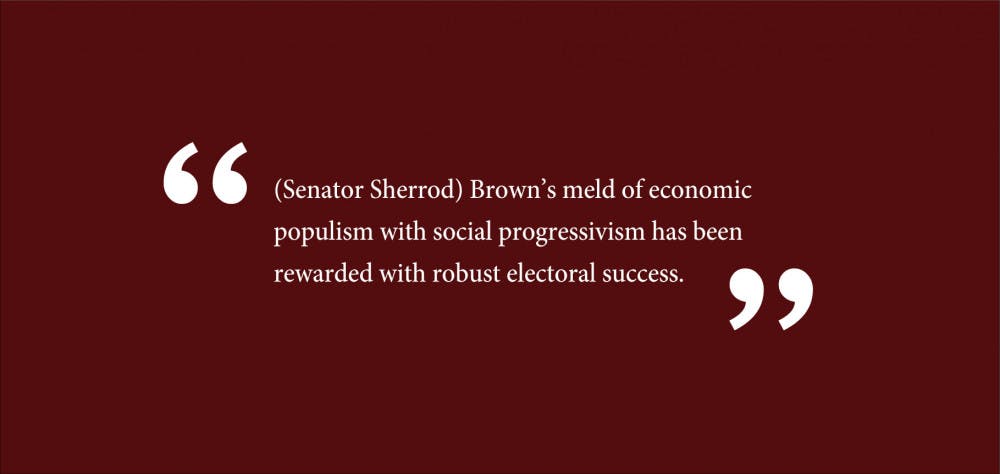As the crowded field of Democratic presidential hopefuls grows ever larger, and candidates attempt to distinguish themselves, their decisions inevitably augur the ideologies that will be prominent during the primaries. Certainly, the reactions to the Green New Deal, among other ambitious left-wing proposals, foreshadow a further and perhaps perpetual elevation of progressive values. The scope of these packages is vast; they attempt nothing short of remedying economic inequality and promoting an enduring form of social justice. But as Democratic candidates attempt to articulate a vision for the future, it may be instructive to incorporate ideologies from the past. A more explicit focus on labor and the dignity of workers is appropriate during a time of broad economic anxiety — and importantly, does not contradict progressive ideals of social justice. Fighting for the working class — the archetypal Trump voter — can thus be woven into the broader fabric of progressive rhetoric.
In Ohio, Democratic Sen. Sherrod Brown captures the spirit of both pro-labor Democrats of the past and the progressive wing of today. Brown is a throwback; he fights for economic justice from the perspective of labor, hoping to reassert his party as the true champion of the middle class. He takes immense pride in expanding workers’ rights, perhaps best exemplified by the pin of a yellow canary that adorns his lapel every day. In the years before strong collective bargaining and adequate safety measures, coal miners used canaries in the mines to monitor for dangerous levels of gas — miners knew they had to evacuate if the canary died. “The canary pin is an important symbol for me,” Brown said on the 2018 Senate campaign trail. “Protecting workers’ rights isn’t a battle that’s behind us — not by a longshot.”
Further burnishing his pro-labor image, Brown fights for unions, which have seen plummeting membership in recent decades. Waning union activity has paralleled a stagnation in real wages, which have actually declined since 1970. Brown fights not only for collective bargaining, but for workers’ dignity. In a time of anxiety about job stability — a 2017 Pew poll found that 72 percent of respondents were worried about losing their job to automation — politicians too often speak of jobs purely in terms of existence. By stressing “the dignity of work” — a refrain of his 2018 re-election bid — Brown shows that the quality of employment should not be forgotten amid the rush to add jobs to the economy. Wages, benefits and self-agency matter — all of which would reduce anxiety and economic inequality. As President Trump continues to betray the Rust-Belt workers who voted for him in 2016 by passing corporate tax cuts, a middle-class warrior like Brown could supplant him in the Midwestern swing states.
And while he shares the same distaste for free trade deals that Trump frequently invoked in his 2016 campaign — Brown has opposed the North American Free Trade Agreement since its inception — his brand of economic populism has little in common with the nativist, racist demagoguery of the Trump campaign. Instead, Brown articulates an inclusive vision of the ideology: “Populism isn’t racist; it’s not anti-Semitic; it doesn’t divide people,” he said in a recent interview. “That’s what real populism is. It’s taking on money, it’s taking on influence, it’s taking on privilege.”
Brown’s meld of economic populism with social progressivism has been rewarded with robust electoral success. As the GOP’s influence grows in the Buckeye state, Brown has held firm. In the same election that sent Republican Mike DeWine to the governor’s mansion, Brown nonetheless secured re-election by 7 percentage points — accruing 10 extra points from Clinton’s 2016 mark.
Most importantly, Brown has survived as a red-state Democrat without capitulating on social issues. He is for abortion rights in a culturally conservative state. As a second-term congressman in 1996, he voted against the Defense of Marriage Act, which a majority of congressional Democrats voted for. And he has carried an F-rating from the National Rifle Association for over a decade. Unlike the false dichotomy depicted in the 2016 presidential election, Brown shows how one can simultaneously fight for workers’ rights and social justice.
There are certainly concerns about Brown’s electability. His bland gruffness and lack of fiery rhetoric are unlikely to excite a bloodthirsty Democratic base in the primaries. But the significance of Brown’s message extends beyond his individual political arc. His pro-worker message could precipitate a larger shift toward labor in the Democratic Party, which has somehow lost the vote of the working class, despite advocating policies that support labor far more than those of the tax-cutting Republicans. Of course, Brown is not the only candidate who communicates such a message of progressive populism. Sen. Amy Klobuchar (D-Minn.) — who announced her candidacy on Sunday — has a similar brand of politics with even stronger electoral results, though less explicitly populist. As the primary process begins to accelerate, it seems that the onus will be on the candidate’s ability to prove their progressive loyalties. But Brown shows that regardless of the candidate, these admirable ideals of social justice need not exist in a zero-sum relationship with pro-labor policies.
Derek Simshauser ’20 can be reached at derek_simshauser@brown.edu, or followed on Instagram @dsimshauser. Please send responses to this opinion to letters@browndailyherald.com and op-eds to opinions@browndailyherald.com.





